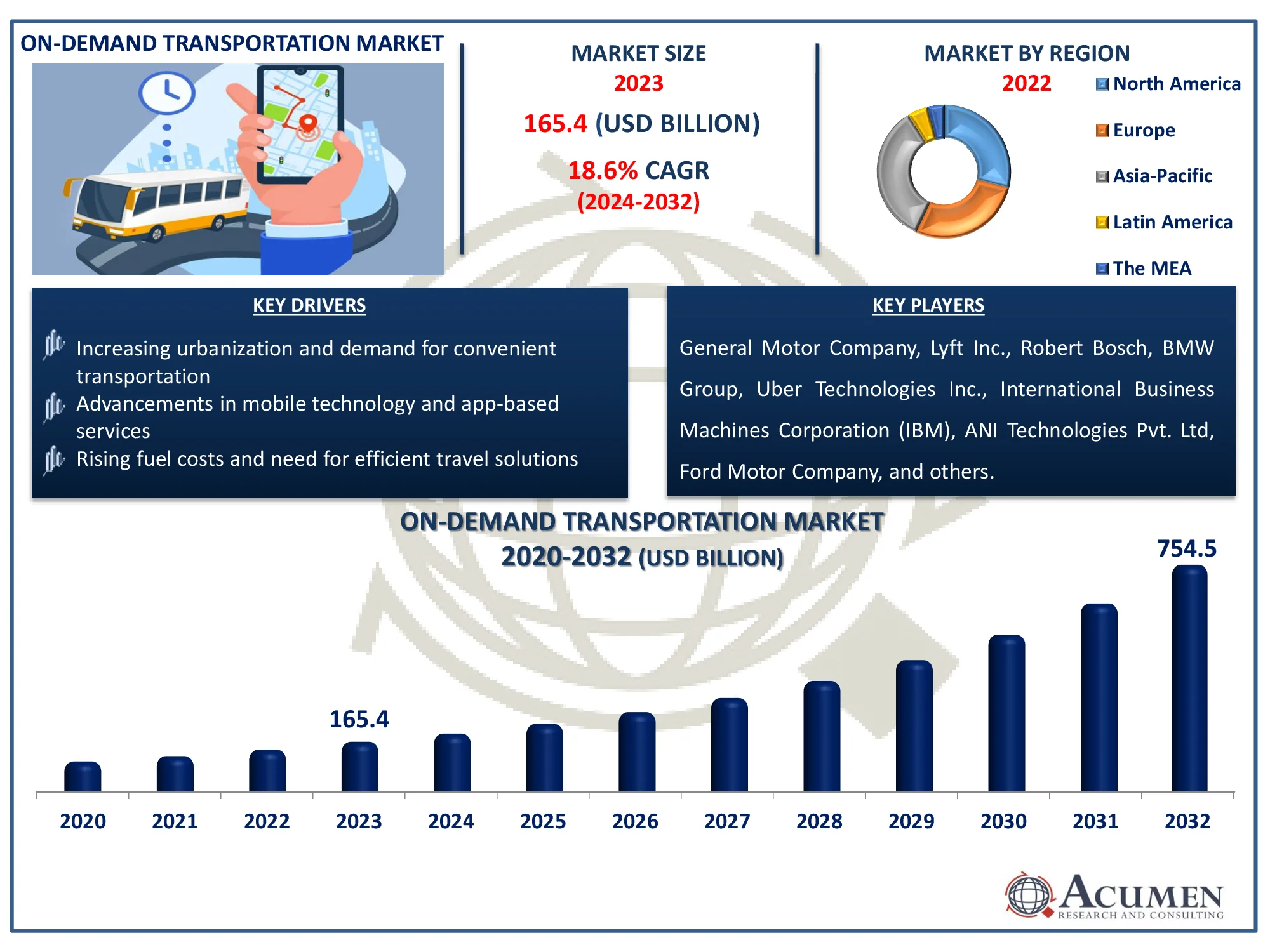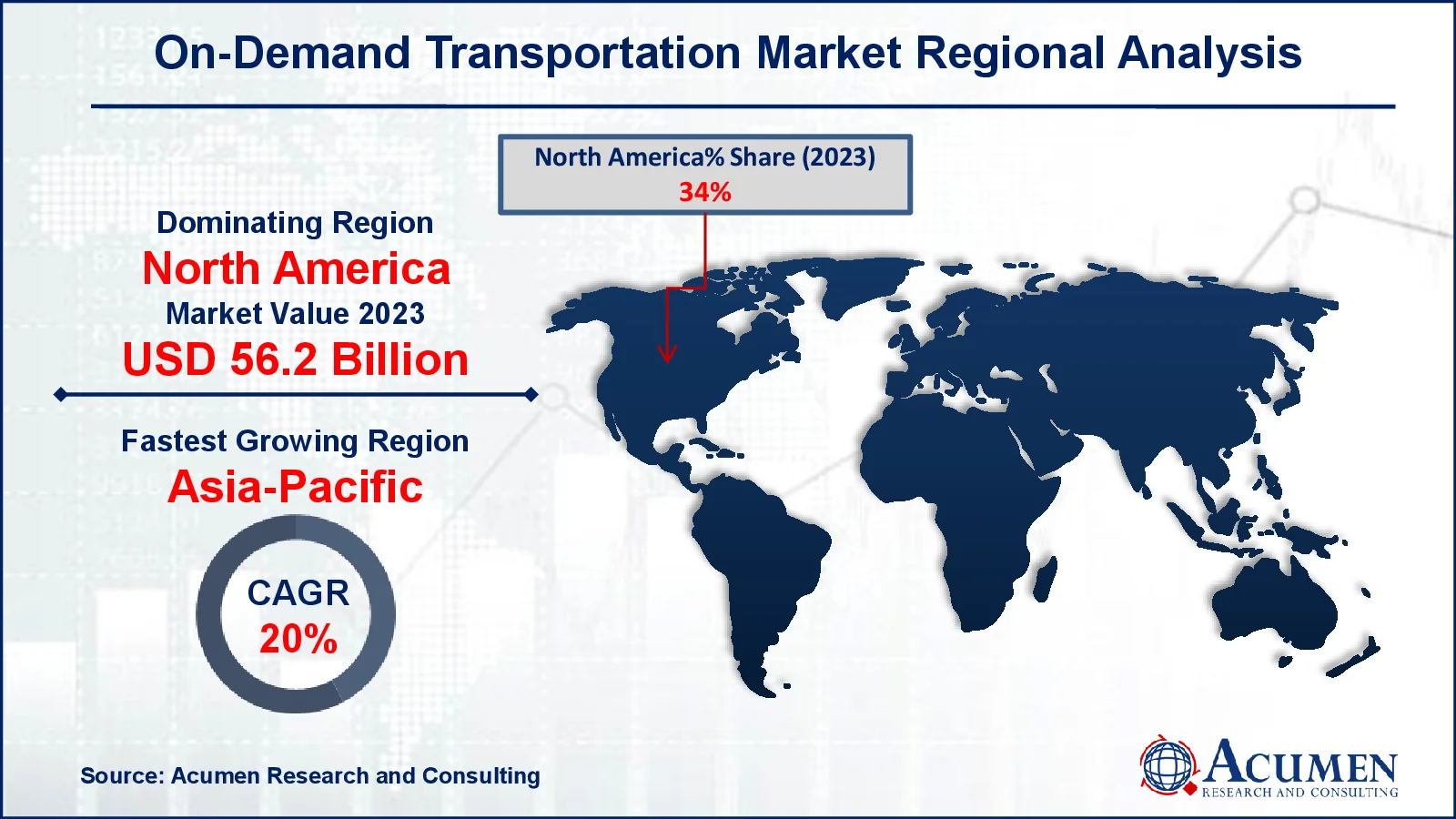May 2022
The Global On-Demand Transportation Market is set to grow significantly, from USD 165.4 Billion in 2023 to USD 754.5 Billion by 2032, with a CAGR of 18.6%. Learn about the key trends driving this growth.
The Global On-Demand Transportation Market Size accounted for USD 165.4 Billion in 2023 and is estimated to achieve a market size of USD 754.5 Billion by 2032 growing at a CAGR of 18.6% from 2024 to 2032.
On-Demand Transportation Market Highlight

On-demand transportation refers to a flexible and dynamic transportation model that allows users to request rides or transport services as needed, rather than adhering to fixed schedules. This model leverages technology, often through mobile apps, to connect passengers with drivers or transportation services in real time. Applications of on-demand transportation include ride-sharing services like Uber and Lyft, where users can book rides instantly. It also extends to on-demand bike or scooter rentals, and even to food delivery services where transportation is optimized for efficiency. This approach enhances convenience, reduces wait times, and improves overall accessibility to transportation options. Additionally, it supports urban mobility by providing alternative solutions to traditional public transport systems.
Global On-Demand Transportation Market Dynamics
Market Drivers
Market Restraints
Market Opportunities
On-Demand Transportation Market Report Coverage
| Market | On-Demand Transportation Market |
| On-Demand Transportation Market Size 2022 |
USD 165.4 Billion |
| On-Demand Transportation Market Forecast 2032 | USD 754.5 Billion |
| On-Demand Transportation Market CAGR During 2023 - 2032 | 18.6% |
| On-Demand Transportation Market Analysis Period | 2020 - 2032 |
| On-Demand Transportation Market Base Year |
2022 |
| On-Demand Transportation Market Forecast Data | 2024 - 2032 |
| Segments Covered | By Service Type, By Vehicle Type, And By Geography |
| Regional Scope | North America, Europe, Asia Pacific, Latin America, and Middle East & Africa |
| Key Companies Profiled | General Motor Company, Lyft Inc., Robert Bosch GmbH, BMW Group, Uber Technologies Inc., International Business Machines Corporation (IBM), ANI Technologies Pvt. Ltd, Ford Motor Company, Avis Budget Group Inc., and Mercedes-Benz Group. |
| Report Coverage |
Market Trends, Drivers, Restraints, Competitive Analysis, Player Profiling, Covid-19 Analysis, Regulation Analysis |
On-Demand Transportation Market Insights
Increasing urbanization fuels the need for efficient and flexible transportation solutions, leading to a rise in demand for on-demand transportation services. For instance, by the end of 2023, China's urbanization rate stood at 66.2%, and it is projected to reach between 75% and 80% by 2035. As cities become more congested, individuals seek alternatives to traditional public transport, preferring services that offer convenience and real-time accessibility. This shift is driven by the desire for personalized travel experiences and the ease of using mobile technology. Consequently, the on-demand transportation market is expanding rapidly to meet these evolving urban mobility needs.
Privacy and security concerns significantly impact the on-demand transportation market, as companies handle vast amounts of personal and location data. Ensuring robust data protection measures is crucial to prevent breaches and misuse. Regulatory compliance, such as adhering to GDPR or CCPA, adds complexity and costs. These factors can hinder market growth and innovation while increasing operational overhead for businesses.
The expansion of smart city initiatives and infrastructure development is significantly boosting the on-demand transportation market. For instance, as of July 2024, 7202 of the 8018 tendered projects have been completed in India, with ₹144,530 crores utilized out of the total tendered amount of ₹164,163 crores. These modern urban strategies prioritize efficient, technology-driven mobility solutions, creating a surge in demand for flexible, real-time transportation services. Enhanced infrastructure supports better connectivity and accessibility, making on-demand services more viable and attractive to urban residents. This growth is further fueled by the integration of smart technologies, which streamline operations and improve user experience.
On-Demand Transportation Market Segmentation
The worldwide market for on-demand transportation is split based on service type, vehicle type, and geography.
On-Demand Transportation Service Types
According to the on-demand transportation market forecast, the e-hailing service type is expected to dominate the market due to its convenience and efficiency. With the integration of advanced technology, e-hailing apps streamline ride booking, real-time tracking, and cashless payments, significantly enhancing user experience. Additionally, the rise in smartphone penetration and urbanization supports the growth of e-hailing services, making them a preferred choice for consumers seeking flexible and reliable transportation solutions. For instance, according to World Economic Forum, as of January 2023, India boasts over 700 million smartphone users, with 425 million residing in rural areas. More than half of the population now uses smartphones, and the number of active internet users has surged by 45% since 2019. This growth positions rural India at the heart of the global smartphone revolution. As competition intensifies, e-hailing platforms are likely to further innovating and expand, reinforcing their market leadership.
On-Demand Transportation Vehicle Types
According to the on-demand transportation industry analysis, four-wheeler vehicles dominate the market due to their versatility, comfort, and ability to accommodate multiple passengers. They offer a balance between affordability and luxury, making them a preferred choice for both short and long trips. Their larger size compared to two-wheelers also provides enhanced safety and convenience. Additionally, advancements in technology and ride-hailing apps have further amplified their popularity and accessibility.
On-Demand Transportation Market Regional Outlook
North America
Europe
Asia-Pacific
Latin America
The Middle East & Africa

On-Demand Transportation Market Regional Analysis
For several reasons, North America leads the on-demand transportation market due to its advanced technological infrastructure, high urbanization rates, and strong consumer demand for convenience. For instance, over the past 200 years, the United States has shifted from being mostly rural and focused on farming to becoming a country with many large cities and industries. The presence of major ride-hailing companies and substantial investment in digital payment systems further supports this dominance. Additionally, favorable regulatory environments in key cities encourage innovation and market growth. This combination of factors ensures that North America remains at the forefront of the on-demand transportation sector.
The Asia-Pacific region is experiencing rapid growth in the on-demand transportation market due to a surge in urbanization, rising focus towards digitalization, and increasing smartphone penetration. For instance, the Digital India initiative is a key program of the Government of India designed to turn the country into a digitally empowered society. These factors have led to a higher demand for convenient and efficient transportation solutions. Additionally, supportive government policies and a burgeoning start-up ecosystem are fueling market expansion.
On-Demand Transportation Market Players
Some of the top on-demand transportation companies offered in our report include General Motor Company, Lyft Inc., Robert Bosch GmbH, BMW Group, Uber Technologies Inc., International Business Machines Corporation (IBM), ANI Technologies Pvt. Ltd, Ford Motor Company, Avis Budget Group Inc., and Mercedes-Benz Group.
Looking for discounts, bulk pricing, or custom solutions? Contact us today at sales@acumenresearchandconsulting.com
May 2022
July 2020
December 2024
April 2020